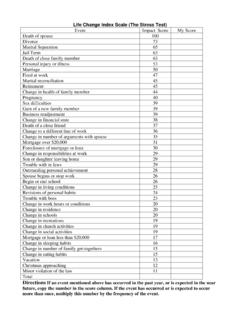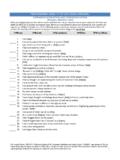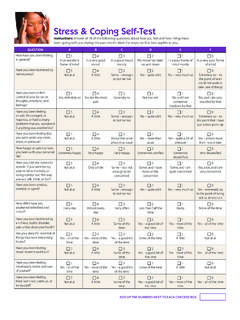Transcription of Lesson Plan: Dealing with Stress - YooMagazine
1 1 Lesson plan : Dealing with Stress Objective: Identify effects of Stress on everyday issues and strategies to reduce or control Stress . Time: 45-60 minutes Structure: On-line homework before class ( Stress Questionnaire) Teacher introduction- large group Brainstorm and Q & A on Stress - small group Coping with Stress worksheet- individual Stress coping skills practice- large group Reducing Stress strategies- individual homework Materials: Handout: Stress questionnaire (from website) Handout.
2 Q&A on Stress Handout: Fact sheet on Stress /anxiety Handout: Coping with Stress worksheet Handout: Stress Coping Skills Materials: Flip chart paper and markers Introduction: Stress is part of life, we all experience it, some have more than others, some manage it differently. Too much Stress can affect your mood, your relationships, and your school performance. It is important to help students identify signs of Stress , how it affects them, and what they can do about it.
3 Details of Class Lesson plan : Preparatory Work: Ask the students to fill out the Stress questionnaire on-line the night before the class and print out the results page. Introduction: Teacher to introduce topic of Stress - that everyone experiences it, some more than others. Too much Stress can affect your mood, your relationships, and your school performance. This workshop is to help you learn how to recognize Stress , and skills to reduce and cope with Stress in your everyday life. Making life a whole lot more fun!
4 ! Large Group activity: After the introduction ask the group to raise hand if they think they are under too much Stress ? And put checks on board low, medium and high. Then ask them how this compares to how they scored on the Stress quiz? How does their level of Stress compare to others? 2 Small group activity: Brainstorm with flip chart paper and markers: physical responses to Stress (headache, stomach ache, loss of appetite, poor sleep, tiredness, poor concentration) and emotional responses to Stress (sadness, loneliness, irritability, anger, anxiety, withdrawal).
5 How does Stress affect academic performance, relationships, and other parts of your life? Next hand out Q&A on Stress to group, then give out fact sheet and have them grade it as a group. Individual activity: Hand out the coping with Stress worksheet. Have students identify a stressful situation they recently experienced and how they handled it- write down how they deal with Stress - good and bad. If needed give examples of stressful situations: breakup in relationship, upcoming test/project, failing test, fight with parents, fight with friend.
6 Skill building: Hand out Stress Coping Skills Sheet. Review skills and practice breathing and muscle relaxation as a class. Have them return to their worksheet and write down the skills they used and new skills they could try in the future to better manage Stress . Media clips: TV show or music youth identify as Stress reducing or Stress provoking. Homework: Write down positive changes they are going to make in next 2 weeks to reduce and better manage stressing their lives, have Stress quiz again in 2 weeks to see how they are doing.
7 3 Stress Q and A 1. All Stress is bad. T or F False, Stress reaction in the body is designed to protect it from dangerous situations and in small amounts can increase performance. It is too much Stress for too long that begins to impact your mood, functioning and relationships when you know you are not managing Stress very well. 2. There is nothing you can do about Stress , it happens and you endure it. T or F False, there are many ways to learn to cope with and manage Stress , as well as decrease Stress in your life.
8 Basic lifestyle changes including getting enough sleep, eating well and regular exercise can reduce Stress and increase your ability to deal with Stress . 3. No one else has as much Stress as I do, that s why I m overloaded. T or F False, everyone experiences Stress , some do experience more Stress than others, but it is your ability to manage and cope with Stress that determines whether you control it, not the amount of Stress . 4. Nothing bad can happen to me from too much Stress . T or F False, too much Stress can negatively effect concentration, problem solving, personal interactions, and school performance.
9 It can also lead to physical and mental health problems including headaches, stomachaches, anxiety, depression, drug use and aggression. 4 Fact Sheet on Stress /Anxiety Stress is a state of tension related to your body attempting to cope with its environment, it s the body s way of preparing to meet a tough situation. Anxiety is a sense of apprehension, dread and/or uneasiness. We tend to perceive anxiety and Stress as negative, but in fact both are normal and can be adaptive. The Stress response involves the nervous system and specific hormones in the body, and it enhances the ability to perform under pressure as well as avoid danger.
10 It is when Stress is excessive or ongoing and interfering with functioning that anxiety and Stress become a problem. This can lead to wearing out the body s reserves and leaving a person feeling depleted or overwhelmed, weakening the immune system and making it harder to cope with daily demands. There are effective treatments available for anxiety and Stress management. The first step is to learn to recognize when you are stressed, the next is to find a way to deal with Stress . Common symptoms of Stress and/or anxiety: - trouble catching your breath - butterflies in your stomach - sweaty and/or trembling hands - feeling lightheaded - feeling nervous or jumpy - feeling overwhelmed - feeling tired all the time - having trouble concentrating - irritability and moodiness - headaches - problems sleeping - feeling sad or depressed Problems related to anxiety and Stress are among the most common reasons for people to see health professionals.






